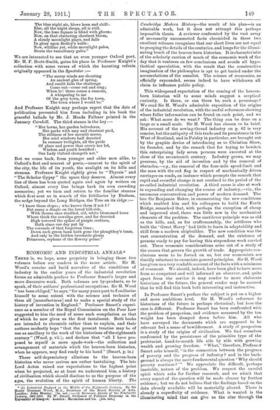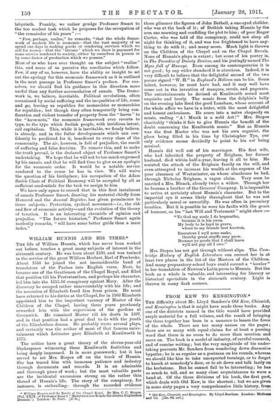ECONOMIC AND INDUSTRIAL ANNALS.*
THERE is, we hope, some propriety in bringing these two volumes before our readers in the same article. Sir H. Wood's concise and lucid narrative of the conditions of industry in the earlier years of the industrial revolution forms an admirable preface to Professor Smart's larger and more discursive work. Both volumes are by-products, so to speak, of their authors' professional occupations. Sir H. Wood "has been obliged," he says, "for many years past to flan iliarise himself to some extent with the science and technics of them all [manufactures] and to make a special study of the history of invention in England." Professor Smart's experi- ence as a member of the Royal Commission on the Poor Law suggested to him the need of some such compilation as that of which he now gives us the first instalment. Both books are intended to chronicle rather than to explain, and their authors modestly hope "that the present treatise may be of use as ancillary to the work of the historians of the eighteenth century" (Wood, p. vii.); and declare that "all I have pro- posed to myself is mere spade-work—the collection and arrangement of materials which the heaven-born historian, when he appears, may find ready to his hand" (Smart, p. ix.) These self-depreciatory allusions to the heaven-born historian who never arrives are rather tantalising. The late Lord Acton raised our expectations to the highest point when he projected, so at least we understood him, a history of civilisation which should disclose to us the purpose of the ages, the evolution of the spirit of human liberty. The * (1) Industrial England in the Middle of the Eighteenth Century. By Sir Henry Trneman Wood, M.A., Secretary of the Royal Society of Arts. London: John Murray. [5s. net. J-,---(2) Economic Annala of the Nineteenth Century, ism-isos. By W. Smart, Professor of Political Economy in the University of (ilaagow. Lenten: flacraillan and Co. pis. net.1 Cambridge Modern History—the result of his plan—is an admirable work, but it does not attempt this perhaps impossible thesis. A reviewer confronted by the vast array of necessarily unconnected facts chronicled in these two excellent volumes recognises that our short lives are not equal to grasping the details of the centuries, and longs for the illumi- nating touch of the heaven-born historian. It is characteristic of the scholarly caution of much of the economic work of the day that it ventures on few conclusions and avoids all hypo- thetical speculation, with the result that the constructive imagination of the philosopher is apt to get buried under the accumulations of the annalist.. The science of economics, as officially expounded, seems indeed to have withdrawn all claim to influence public policy.
This widespread expectation of the coming of the heaven- born historian will to some minds suggest a sceptical curiosity. Is there, or can there be, such a personage ? We read Sir H. Wood's admirable exposition of the origins of the industrial revolution, with the useful references showing where fuller information can be found on each point, and we ask : What more do we want ? The thing can be done on a large or a small scale. Sir H. Wood has chosen to be brief. His account of the sewing-thread industry on p. 62 is very concise, but the antiquity of this trade and its persistence in the West of Scotland, and in Paisley in particular, are brought out by the graphic device of introducing us to Christian Shaw, its founder, and by the remark that for trying to bewitch this enterprising lady seven persons were executed at the close of the seventeenth century. Industry grows, we may presume, by the aid of invention and by the removal of obstacles,—e.g., the removal of the four-mile speed-limit and the man with the red flag in respect of mechanically driven carriages on roads, an instance which prompts the remark that rapid and eventful change is not confined to the period of the so-called industrial revolution. A third cause is also at work in expanding and changing the course of industry,—viz., the enormous concentration and power of modern demand. The late Sir Benjamin Baker, in enumerating the new conditions which enabled him and his colleagues to build the Forth Bridge, remarked that, with perhaps the exception of cheap and improved steel, there was little new in the mechanical elements of the problem. The cantilever principle was as old as the hills, and, as for craftsmanship, the artificers who built the Great Harry' had little to learn in adaptability and skill from a modern shipbuilder. The new condition was the vast concentration of the demand, and the existence of persons ready to pay for having this stupendous work carried out. These economic considerations arise out of a study of the causes that govern the growth of trade. Appropriate con- clusions seem to be forced on us, but our economists are timidly reluctant to enunciate general principles. Sir H. Wood has given us a very readable account of the facts with a minimum of comment. We should, indeed, have been glad to have more from so competent and well informed an observer, and, quite apart from the service it may render to more elaborate historians of the future, the general reader may be assured that he will find this book both interesting and instructive.
In Professor Smart's preface the subject is put on a higher and more ambitious level. Sir H. Wood's reference to historians of the future is perhaps rhetorical; but here the case is different. Professor Smart has been confronted with the problem of pauperism, and evidence measured by the ton weight has been dumped down before him. All who have surveyed the documents which are supposed to be relevant feel a sense of bewilderment. A study of pauperism is a study of the origins of civilisation. We find ourselves confronted by the persistence of the primitive type of the proletariat, hand-to-mouth life side by side with growing wealth and growing freedom. "What," therefore, Professor Smart asks himself, "is the connection between the progress of poverty and the progress of industry? and in the back- ground is always the more fundamental question Why should poverty continue F ' " We appreciate the difficult, perhaps insoluble, nature of the problem. We respect the careful spirit which asks for further research, and we admit that every aspect of the question will be made clearer by further evidence ; but we do not believe that the findings based on the data already available will be materially altered. There is already a superfluity of evidence. What is wanted is the illuminating mind that can give us the clue through the labyrinth. Frankly, we rather grudge Professor Smart to the too modest task which he proposes for the occupation of "the remainder of his years" :— "Few, perhaps, realise," he remarks, "that the whole frame- work of modern life is economic—that the vast majority of us spend our days in making goods or rendering services which we sell for money—that the ' income ' which we draw is payment for some service rendered to society, either by ourselves in person or by some factor of production which we possess."
Most of us who have ever thought on the subject "realise" this, and some of us perceive the corollaries which follow.
Few, if any of us, however, have the ability or insight to set
out the apology for this economic framework as it is outlined in the next passage in Professor Smart's preface. For our- selves, we should find his guidance in this direction more useful than any further accumulation of annals. The frame- work is, we believe, inevitable. Political revolutions, often occasioned by social suffering and the inequalities of life, come and go, leaving us republics for monarchies or monarchies for republics ; but though they often temporarily bring con- fiscation and violent transfer of property from the " haves " to the "have-note," the economic framework ever reverts to type, to the type which foolish people, with invidious intent, call capitalism. This, while it is inevitable, we firmly believe, is already, and in the fuller developments which can con- fidently be predicted for it, beneficent to every class of the community. The air, however, is full of prejudice, the result of suffering and false doctrine. To remove this, and to make the truth prevail, is the declared object of Professor Smart's undertaking. We hope that be will not be too much engrossed by his annals, and that he will find time to give us an apologia for the economic order. It would be a notable service rendered to the cause he has in view. We will waive the question of his birthplace; his occupation of the Adam Smith Chair of Political Economy will be accepted by all as sufficient credentials for the task we assign to him.
We have only space to record that in this first instalment of annals Professor Smart, drawing his material chiefly from Hansard and the Annual Register, has given prominence to three subjects : Protection, cyclical movement—i.e., the ebb and flow of economic activity—and the evolution of the theory of taxation. It is an interesting chronicle of opinion and prejudice. "The future historian," Professor Smart again modestly remarks, "will have some better guide than a mere index."























































 Previous page
Previous page